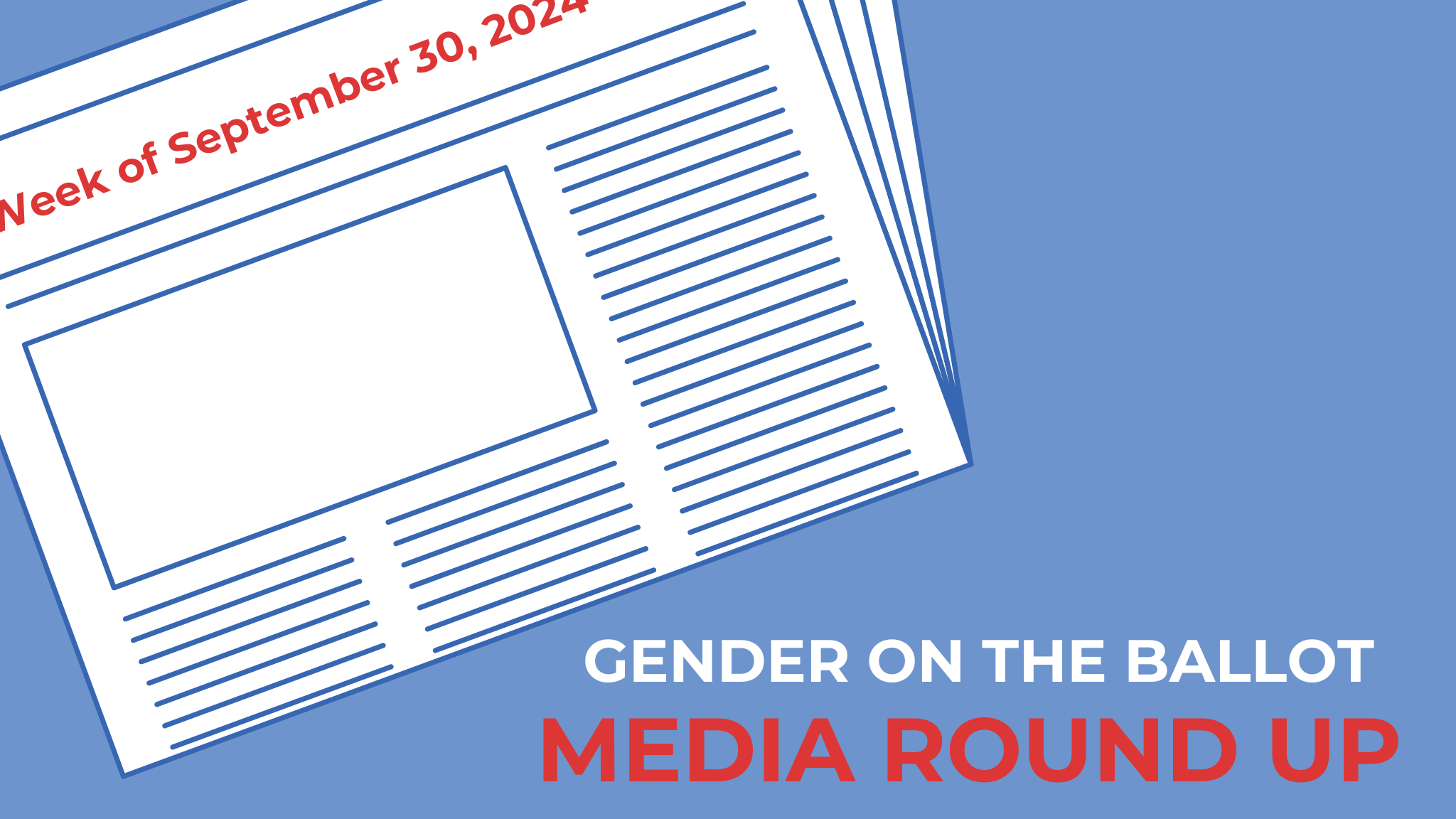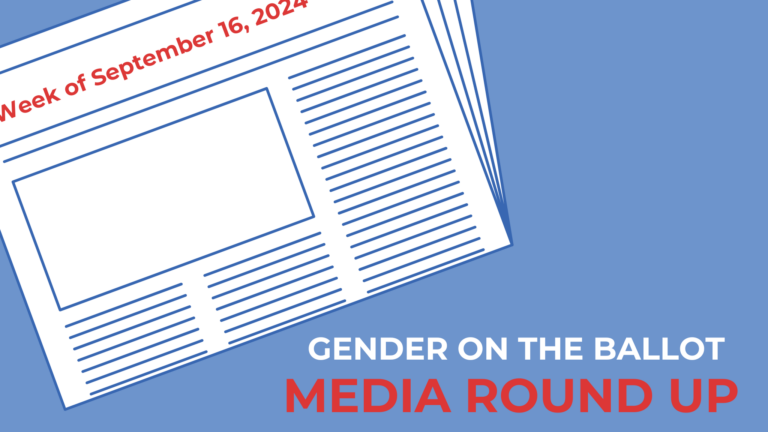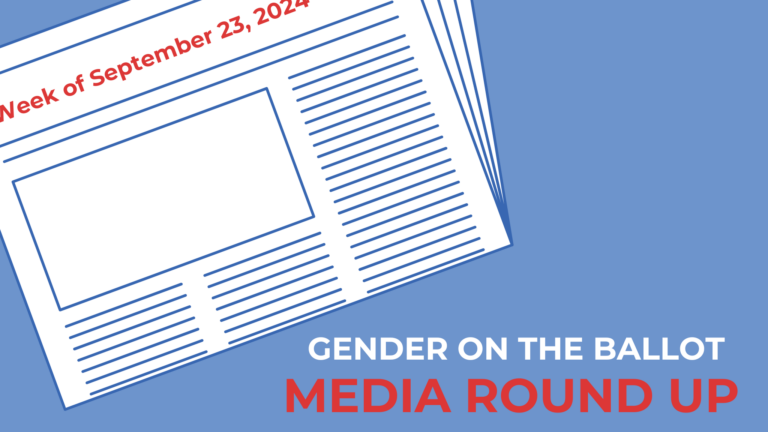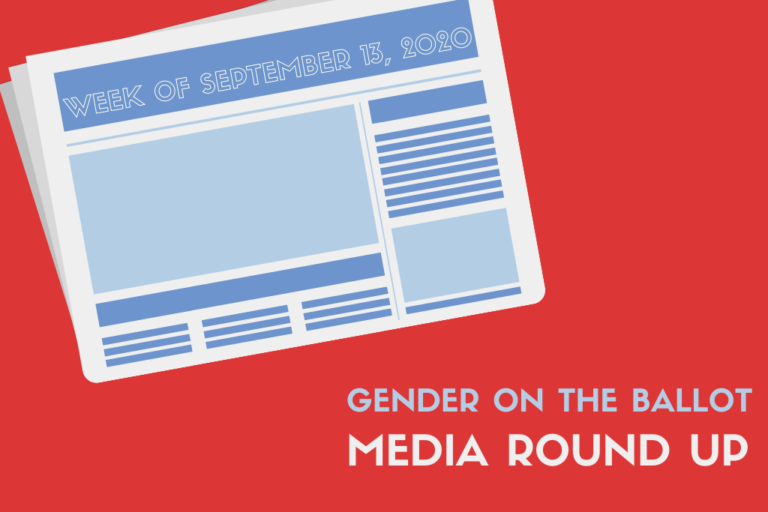Happy Friday! Welcome to our Media Round Up. Each week we’re collecting and sharing our…
Media Round Up: Week of September 30, 2024

Happy Friday! Welcome to our Media Round Up. Each week we’re collecting and sharing our favorite gender + politics stories.
Harris & Cheney display bipartisan unity in birthplace of Republican party
The 19th*, Shefali Luthra
Ending weeks of speculation, Vice President Kamala Harris (D–California) and former Congresswoman Liz Cheney (R-Wyoming) appeared together for the first time since Cheney’s endorsement in the symbolic birthplace of the Republican party. While the two “may not see eye to eye on every issue,” this historic pairing illustrates what many believe is women in politics’ ability to find common ground for the common good in an increasingly polarized political climate.
Four Prominent Previously Pro-Trump GOP Women to Make the Case Against Him in Battleground Pennsylvania
CNN, Jake Tapper
Next week, former House GOP conference chair Liz Cheney and former Trump White House aides Alyssa Farah Griffin, Cassidy Hutchinson, and Sarah Matthews will make the case against the reelection of former President Donald Trump. The event, which will take place as a fireside chat in Montgomery County, Pennsylvania, will follow Cheney’s expected appearance with Vice President Kamala Harris in Wisconsin. It is likely to be the first of many events with the four GOP women to be held in battleground states; a source told CNN that the women will “offer a warning about the threat Donald Trump poses to democracy and the rule of law.”
The unexpected gender dynamics shaping the 2024 election
CNN, Rowland Brownstein
Utilizing multiple sources, reports and polls, CNN paints a complex and intersectional picture of the influences on men’s and women’s perspectives in the 2024 election cycle. Preferences for traditional or egalitarian gender roles are correlated with cultural identities such as sex, party, religion, geography, education, class and race. Read on…and then look at former First Lady Melania Trump’s public rebuke of conservative views on reproductive rights in Melania Trump, in rare break with husband, voices support for abortion rights. Finally, if you haven’t already read Diana Carlin’s GOTB Blog: The Inevitability of a First Gentleman in Our Lifetimes,” it will give you great perspective and context for the former First Lady’s statements.
Meet the Moderators: Margaret Brennan and Norah O’Donnell of CBS News
The New York Times, Michael M. Grynbaum
Tuesday night’s Vice Presidential debate between Senator JD Vance (R) and Governor Tim Walz (D) had a focus on civility and mutual respect, fostered in part by its two women moderators. Norah O’Donnell and Margaret Brennan, both CBS News contributors, led the debate. O’Donnell, current anchor of CBS Evening News, has a long career in journalism as the CBS former chief White House correspondent and covering the White House, Congress, and the Pentagon for NBC. She moderated a Democratic presidential primary in 2020 with Gayle King. Brennan currently moderates CBS “Face the Nation” and is its chief foreign affairs correspondent. She’s covered the State Department and White House at CBS and previously worked as a financial journalist for CNBC and Bloomberg.
Vance and Walz lean on their wives in different ways on the trail — and ahead of the VP debate
NBC News, Alec Hernández and Katherine Koretski
Both potential first ladies were involved in preparations for Tuesday’s debate. Usha Vance, wife of Republican VP nominee JD Vance, and Gwen Walz, wife of Democrat VP nominee Tim Walz, both help their husbands run their campaigns in different ways. Gwen Walz, a longtime public school teacher, helps run face-to-face campaigning events and lead talks to supporters. She’s helped fill in for her husband when he was ill, and speaks on personal issues like infertility and education. Usha Vance, longtime lawyer, takes more of the behind the scenes route by helping with debate prep and campaign strategy. Her background in law has helped her husband craft electoral rhetoric. Both men echo the same sentiment, though: major respect for their wives and their voices.
Women Are More Than Their Bodies
Women’s reproductive rights remain a key issue in the American political landscape following the 2022 overturn of Roe v. Wade. During the vice presidential debate on Tuesday, Governor Tim Walz (D) seized on the story of Amber Thurman, a young Georgia mother who died after driving across state lines to obtain medication to end her pregnancy. A new report shows that overturning the federal right to an abortion has “emboldened prosecutors” to develop even more aggressive methods to prosecute pregnancy, leading many women, like Amber, to travel elsewhere to seek the medical care they need. The report maintains that in a post-Roe world, being pregnant not only places women at risk of dire health outcomes, but also of arrest and prosecution. A recent Georgia judge’s ruling strikes down the state’s six-week abortion ban, with Fulton County Superior Court Judge Robert McBurney arguing that “women are not some piece of collectively owned community property the disposition of which is decided by majority vote.”
Challenging Systemic Barriers
Barriers to parity in politics can exist at home, work and in life. Challenging these barriers can improve the landscape for everyone. For example, the Justice Department will pay out a $22 million settlement for gender bias and unfair dismissals at the FBI to 34 women, in addition to engaging outside experts to ensure that the evaluation process is fair. The bureau had been dismissing female agent candidates at higher rates and subjecting them to harassment during training. Kate Barr is running in North Carolina for their Senate District 37 seat to challenge another barrier – gerrymandering. Her slogan goes like this, “Hi. I’m Kate Barr. And I’m your losing candidate for state Senate District 37,” due to extreme gerrymandering that essentially eliminates competition. On the other side of the country, two Native women are trying to revive the expired Radiation Exposure Compensation Act (RECA). Loretta Anderson, Pueblo of Laguna, and Maggie Billiman, Sawmill Chapter of the Navajo Nation, are focused on getting the bill reauthorized to provide financial support to those harmed by nuclear testing and mining. Finally, all over the world, women are doing “hidden work” in and outside of the home: a digital overload of monitoring, organizing and responding to digital communications for the household. This is a new form of the well documented domestic overload women already carry and can create digital burnout and hardship. Swipe left on a digital ”second shift.”






